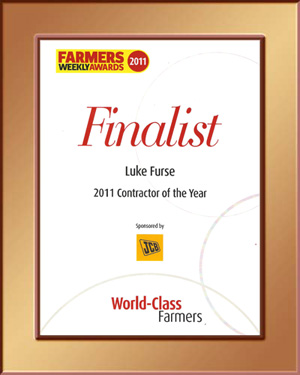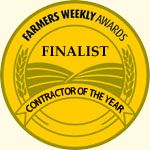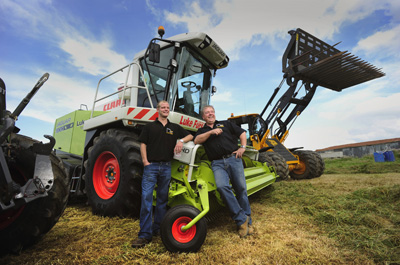 |



This page is a reproduction of an article by Emily Padfield published in Farmers Weekly, September 2011. Adversity can make or break a man. For Devon contractor Luke Furse the former is certainly true. Having left school at 15, and taking on the duties of running the family dairy farm after his father had suffered a heart attack, he knew his future would ultimately be with farm machinery. When his younger two brothers left school, he started to buy and sell whatever he could and, after passing his driving test on a County 954, he earnt his stripes contract ploughing until all hours, and fixing the odd machine in his spare time. In 1978, Luke went to the bank manager in Holsworthy with a tin containing £780 in cash and asked to borrow £1,000 to buy a County tractor with goose-neck trailer. To that the bank manager replied: "I'll give you £1,500 – a little extra – repayable within 12 months. But you'll have to leave the tin with me." With this, Luke went into land drainage, which was mutually beneficial to both farmers and his business thanks to government grants. It wasn't until 1985 that the business ventured into foraging, with the purchase of a Taarup 605 forager. Now, the business runs two foragers, four combines, a self-propelled sprayer and all the kit in-between. Alongside the growth of the agricultural side, the earth-moving part of the business has also grown, partly to spread the risk of being involved in just one industry. "There used to be 18 dairy farmers in the parish. Now, there are only two," explains Luke. Although the two businesses are run separately, part of the success of the Furses' business is that the two compliment each other. At any one time, tractors can be put onto earth moving, and 360 degree diggers can also be pulled in to dig out slurry lagoons, depending on the weather. Not only does this keep the money coming in, explains Luke, it also give variation to the workforce. Coupled with his plant business, the Furses employ some 15 full-time staff – with nine of these kept mainly on agricultural duties. In fact, the first member of staff to start working for the family has stayed with the firm, having started 25 years ago. Competition is fierce in this part of the world, but new business has been gained through Lloyd adopting and investing in new technology such as a state-of-the-art weighbridge that logs weights and qualities of forage, and innovative fertiliser application systems. 
It's this passion for long-term efficiency that's behind the Furses' decision to run four different makes of tractor for three years to decide on which offers the least running costs. And where Luke started, son Lloyd firmly follows. He is now solely in charge of managing both the agricultural kit and staff. Safety and training is paramount, with each member of staff having their own training file and machinery being checked over each morning. Each staff gets a safety pack containing the businesses own method statement, including information such as the procedure for metal detection stoppages when working with the forager. Each member of staff gets one day off a week, should they wish to take it, and a holiday board in the office helps everyone keep up to date. Food is provided daily, with the team stopping for half an hour regardless of the job. Environment plays a key part in the Furse business, and the father and son team have organised events like a Working Wetlands day and yearly maize growing demonstrations to keep farmers up to date with the latest developments. The judges liked
Business facts
|